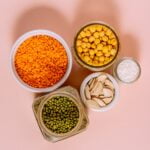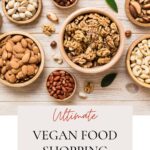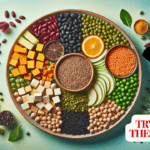Vitamin C is a water-soluble vitamin that is essential for the proper functioning of the body. It helps to support the immune system, promote healthy skin, and aid in the absorption of iron. It is found in a variety of foods, including fruits and vegetables.
In this post, we will look at the top foods for vegetarians or vegans to eat that will provide plenty of vitamin C.
Why Do Vegetarians Need Vitamin C?
Vitamin C, also known as ascorbic acid, is an essential nutrient that is necessary for the proper functioning of the human body. It is a water-soluble vitamin, meaning that it is not stored in the body and must be obtained through the diet or supplements.
It is a potent antioxidant that helps to protect cells from damage caused by free radicals, and it is also necessary for the production of collagen, a protein that is important for healthy skin, blood vessels, and connective tissue.
Vitamin C is involved in many important processes in the body, including the synthesis of collagen, the maintenance of healthy skin, and the promotion of a healthy immune system. It is also involved in the absorption of iron, which is important for the production of red blood cells.
As a vegetarian or vegan, it is important to ensure that you are getting enough vitamin C in your diet.
Vitamin C Foods for Vegetarians & Vegans
While animal-derived foods are not a major source of vitamin C, there are plenty of plant-based foods that are high in this nutrient. Vitamin C is found in a wide variety of these foods, and it is especially abundant in fruits and vegetables. If you are a vegetarian, there are plenty of plant-based sources of vitamin C that you can include in your diet to ensure that you are getting enough of this important nutrient.
One of the best sources of vitamin C for vegetarians is citrus fruits. Oranges, lemons, limes, and grapefruits are all high in vitamin C, and they are also rich in other nutrients such as fiber and folate. You can eat these fruits raw, or you can use their juice to make a refreshing drink.
Another good source of vitamin C for vegetarians is red and green bell peppers. These vegetables are not only high in vitamin C, but they are also a good source of vitamin A, which is important for maintaining healthy vision and skin. You can add bell peppers to salads, sandwiches, or stir-fries, or you can roast them to bring out their sweet flavor.
Kiwifruit is another excellent source of vitamin C for vegetarians. These small, fuzzy fruits are not only high in vitamin C, but they are also a good source of potassium, which is important for maintaining healthy blood pressure. You can eat kiwifruit raw or you can use them to make smoothies or fruit salad.
Papaya is another tropical fruit that is high in vitamin C. It is also a good source of antioxidants and has been shown to have anti-inflammatory properties. You can eat papaya raw or you can use it to make a refreshing fruit salad.
Broccoli is a good source of vitamin C for vegetarians, as well as a number of other nutrients including fiber, vitamin K, and calcium. You can eat broccoli raw or you can steam it, roast it, or add it to soups and stews.
Strawberries are another good source of vitamin C for vegetarians. These sweet, red berries are also a good source of fiber and antioxidants. You can eat strawberries raw or you can use them to make smoothies, fruit salad, or baked goods.
Tomatoes are another vegetable that is high in vitamin C. They are also a good source of lycopene, an antioxidant that has been shown to have a number of health benefits. You can eat tomatoes raw or you can use them to make sauces, soups, and stews.
Peas are a good source of vitamin C for vegetarians, as well as a number of other nutrients including protein, fiber, and vitamin K. You can eat peas raw or you can add them to soups, stews, and casseroles.
Cauliflower is another vegetable that is high in vitamin C. It is also a good source of fiber, vitamin K, and potassium. You can eat cauliflower raw or you can roast it, steam it, or add it to soups and stews.
In addition to these foods, there are also a number of fortified foods that are good sources of vitamin C for vegetarians. For example, many breakfast cereals are fortified with vitamin C, as are some plant-based milks and juices. You can also find vitamin C supplements at your local pharmacy or health food store.
Vitamin C Foods List
Here are some vitamin C-rich foods that are suitable for vegetarians & vegans:
- Citrus fruits: Oranges, lemons, and grapefruits are all high in vitamin C. One medium orange contains about 70 milligrams of vitamin C, which is about 100% of the recommended daily intake. Lemons and grapefruits are also good sources of vitamin C, with one medium lemon or grapefruit containing about 30 milligrams of vitamin C. These fruits can be eaten fresh or added to salads, smoothies, or drinks.
- Bell peppers: Bell peppers are an excellent source of vitamin C, with one medium pepper containing over 120 milligrams of vitamin C, which is about 150% of the recommended daily intake. Bell peppers come in a variety of colors, including green, red, yellow, and orange, and all are good sources of vitamin C. They can be eaten raw, grilled, or added to soups and stews.
- Leafy greens: Leafy greens such as kale, spinach, and broccoli are good sources of vitamin C. One cup of raw kale contains about 80 milligrams of vitamin C, which is about 100% of the recommended daily intake. Spinach and broccoli are also good sources of vitamin C, with one cup of raw spinach or broccoli containing about 40 milligrams of vitamin C. These leafy greens can be eaten raw in salads, or cooked in a variety of dishes.
- Strawberries: Strawberries are a sweet and tasty source of vitamin C, with one cup containing about 85 milligrams of vitamin C, which is about 100% of the recommended daily intake. Strawberries can be eaten fresh or frozen, and are a great addition to smoothies and desserts.
- Tomatoes: Tomatoes are a good source of vitamin C, with one medium tomato containing about 25 milligrams of vitamin C, which is about 30% of the recommended daily intake. Tomatoes can be eaten raw in salads or sandwiches, or cooked in a variety of dishes.
- Pineapple: Pineapple is a tropical fruit that is high in vitamin C, with one cup containing about 130 milligrams of vitamin C, which is about 150% of the recommended daily intake. Pineapple can be eaten fresh or added to smoothies and desserts.
- Guavas: One medium guava contains about 125 milligrams of vitamin C, which is about 150% of the recommended daily intake. Guavas can be eaten fresh or added to smoothies and desserts.
- Papayas: One medium papaya contains about 60 milligrams of vitamin C, which is about 75% of the recommended daily intake. Papayas can be eaten fresh or added to smoothies and salads.
You can find more foods at the Highest Vitamin C Foods post.
Lance has been passionate about the plant-based diet and we have been following a whole food plant-based diet for over 5 years. We focus on health, natural healing, weight management, animal rights, and the health of the planet and environment by focusing on whole plant-based foods and sustainable practices.
Learn more at the About Me page and follow on social media at the links below.






